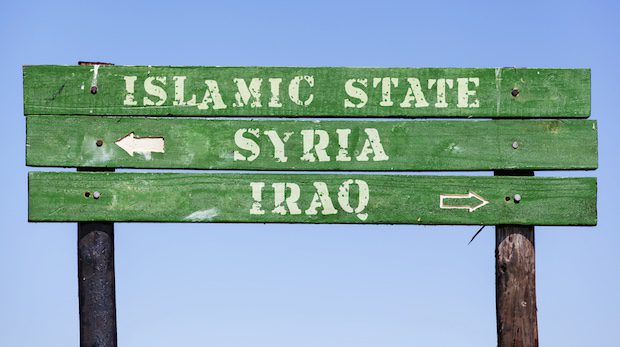This Time, Fight the Real Enemy

It is obvious, or at least I think it is obvious, that France and Europe and the West have little choice but war against the Islamic State. The group has wrecked Syria, rendering millions of Syrians homeless and setting off a refugee flood which threatens to change Europe permanently. It holds territory, a pseudo caliphate, and its propaganda now reaches millions of Europe’s Muslims, offering to those receptive to it a jihadist worldview and military training and access to terrorist networks. It is probably not an overstatement to say that Europe cannot survive with a terrorist entity a short distance from its southern shores, sending its way hundreds of thousands of refugees, scores of armed and trained killers, and a constant flood of jihadist propaganda.
But it is critical that this time the war be fought against the real enemy—not against a fake enemy put forth by internal political factions with quite different agendas. That is what precisely happened in the aftermath of 9/11—when neoconservatives persuaded Dick Cheney, and through him President Bush, to adopt their long-pursued agenda of war against Iraq, even though Iraq had nothing to do with 9/11. The very existence of ISIS is in large part due to this misguided detour: the United States destroyed the Iraqi state, laying the grounds for the radicalization and Islamization of hundreds of thousands Iraqi Sunnis. Remnants of the destroyed Iraqi military became the military leaders of ISIS.
The dual temptation now is fight a war against all Muslims, a campaign that would be bound to fail. During the lengthy negotiation of the Iran nuclear deal, the neoconservatives and Israel spared no effort to depict Iran, run by Shi’ite Muslims, as the primary enemy of the West. Even after the ratification of the deal, Israeli analysts have stressed this point: this recent analysis, promoted in the important neoconservative webzine Mosaic, makes clear that Israel sees the Iran allied Lebanese group Hezbollah and the Assad government as a far greater worry than ISIS. “Tehran’s drive for regional hegemony is a threat to Israel”, say the authors, whereas the Islamic state “currently far from Israel’s borders and with limited military capabilities, does not represent a direct military strategy threat at this time.” Instead they advocate “active measures to topple Assad based on the understanding that … Assad’s ouster will lead to a strategic loss for Iran and Hizbollah.” Israel’s lurid exaggeration of the Iranian threat is well understood in the United States, and Hezbollah would actually not exist absent Israel’s repeated invasions of Lebanon. Basically, Netanyahu would prefer that the United States and its allies fight Russia, Iran, Hezbollah, and Assad rather than the terrorists trying to lay waste to the capitals of the West.
It would seem unlikely, this time around, that they will get their way: Obama understands the Mideast far better than George W. Bush, and at least some Republicans might, or ought to have learned the necessary lessons. But America’s experience with the neocons after 9/11 should leave us never to underestimate them.
Scott McConnell is a founding editor of The American Conservative.